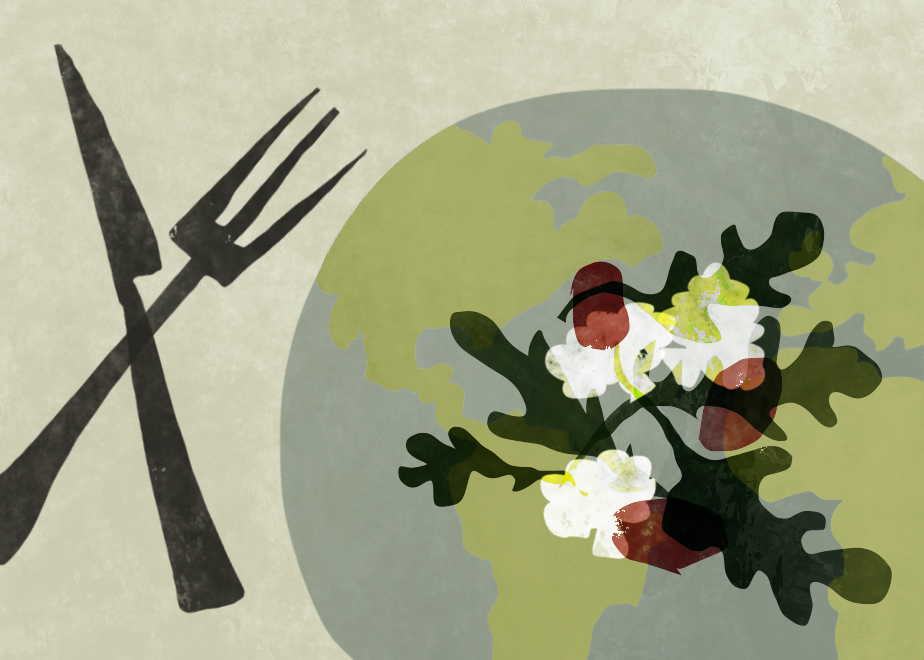Op-Ed: Change your diet for climate change
April 9, 2023

Climate change is one of the most critical issues facing our world today. Every week you’ll find a new headline about climate change in all the major news publications. It’s clear that the planet is in crisis and it’s going to require everyone’s collective effort to change it. Unfortunately, diet continues to be left out of the conversation in mainstream media, yet is a huge player in the downfall of our planet’s health.
According to Humane Society International, animal agriculture is responsible for an estimated 16.5% of global greenhouse gas emissions. This is partly due to the methane produced by cows and other livestock, all the energy it takes to produce animal feed and transport the animals, as well as the fossil fuels used to process the meat for consumption after the animals have been slaughtered.
A vegan diet, in contrast, requires far less resources and energy, and because of that, produces far less greenhouse gas emissions. Plant-based proteins like beans, nuts, seeds and tofu have a much smaller carbon footprint than animal-based proteins. According to the Good Food Institute, plant-based meat uses 47%-99% less land, uses 72%-99% less water and emits 30%-90% less greenhouse gas than conventional meat.
Simply put, it’s more sustainable.
Beyond saving energy, conserving water, and protecting the rainforest and land that is constantly being cleared for grazing cattle and growing feed, a vegan diet/lifestyle has significant health benefits. Plant-based diets have been linked to a lower risk of developing heart disease, type 2 diabetes, a decreased risk of certain cancers and improvement of cholesterol levels, according to Everyday Health.
This isn’t saying that forgoing meat is easy. For many people, meat and dairy are an important part of cultural traditions, as food has a large role in familial ties and connections. There is also the argument that some people can’t adopt a vegan diet because of their blood type, yet a study published in the Journal of the Academy of Nutrition and Dietetics found that blood type does not influence the health benefits of vegan diets, and that no matter what blood type you are, you can eat a plant-based diet.
The other major concern is a lack of certain micronutrients, such as B-12 and iron, and getting enough protein. While it may be more difficult to obtain without meat and dairy, with the right supplements, fortified foods and making sure your diet contains a variety of whole foods and grains, it’s possible to meet all your nutritional needs with a vegan lifestyle. The good news is that it’s becoming less difficult, as restaurants take notice of the higher demand for vegetarian and vegan options.
Chicago has plenty to choose from, with nearly 20 vegan and vegetarian options — and that doesn’t include all the places that have plant-based alternatives on their menus. As our world shifts to accommodate plant-based diets, people are becoming more aware of the environmental, health and sustainability benefits of relying less on animal products.
This is only a start though. According to the Environmental Working Group, the department of agriculture “has spent almost $50 billion in subsidies for livestock operators since 1995, according to an EWG analysis.” And, “the USDA has spent less than $30 million to support plant-based and alternative proteins.” This is likely due to the high demand and a large portion of the population being resistant to the idea of a plant-based lifestyle. Yet with the climate crisis raging on, the time is now to take one of the simplest and most effective steps as individuals.
Collectively, we can make a difference by what we put on our plates. Adopting a plant-based diet is not just necessary to fighting climate change, yet essential to creating a sustainable food system and healthier planet for generations to come.
In the fight against climate change, it might be as simple as leaving dead animals off our plates.







